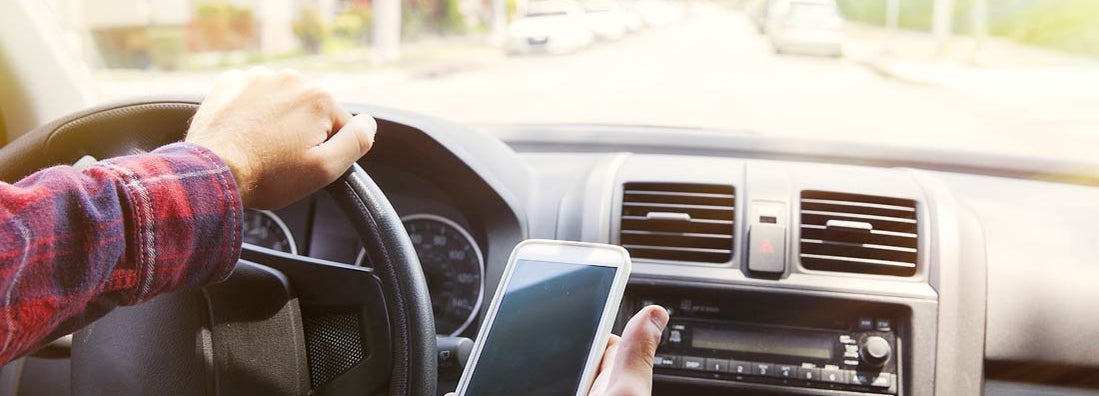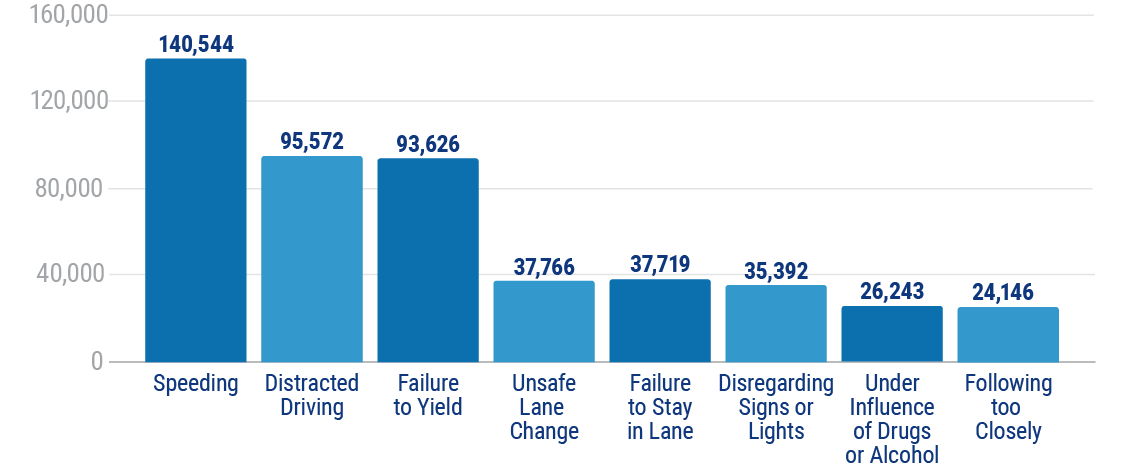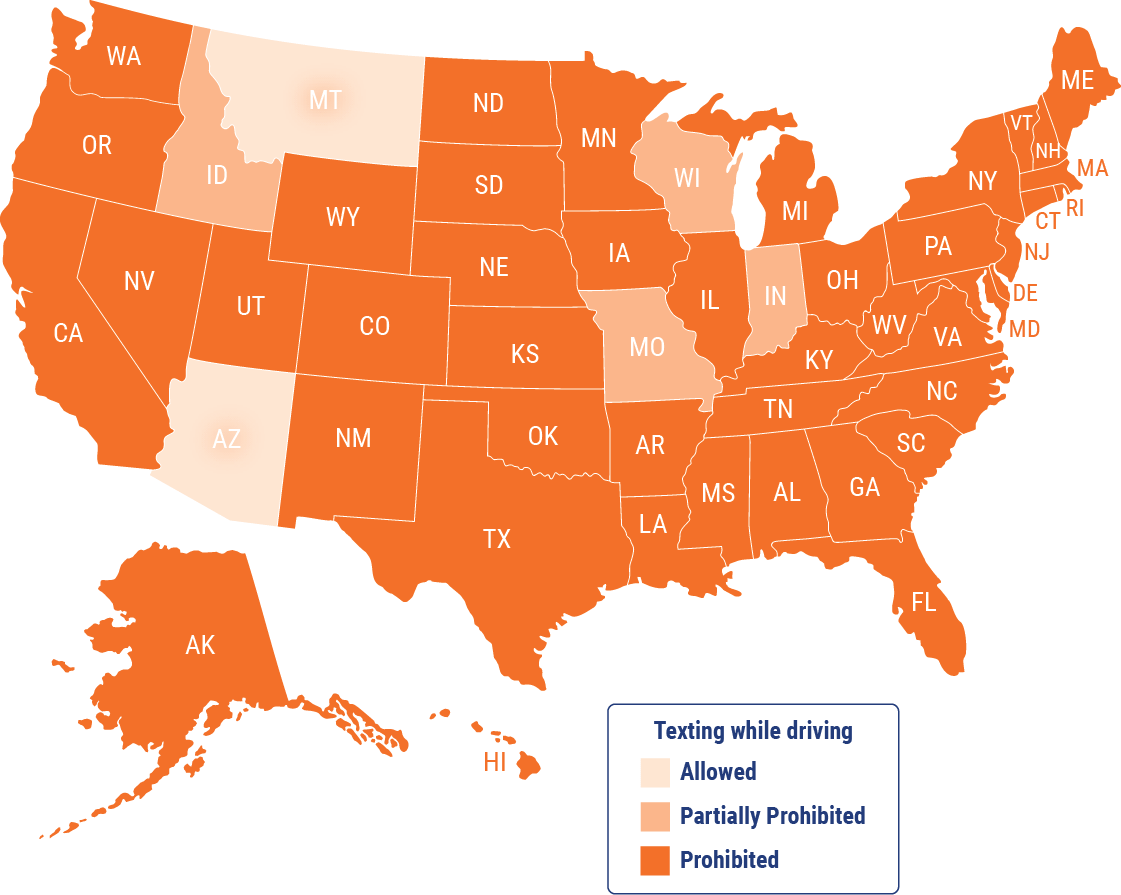Texas Distracted Driving
(It's more than just not texting.)

There are more than 500,000 car accidents every year in Texas. And most of these are simple distracted driving mistakes that are completely preventable.
That’s why arguably THE most important thing you can do behind the wheel is keep your hands at 10 and 2 and your eyes on the road. Always.
What Is Distracted Driving?
The state of Texas defines distracted driving as “any activity that takes your attention away from driving. Distractions can include anything from texting and talking on a mobile phone to eating and drinking, putting on makeup, shaving, reading, programming a navigation system, watching a video and even adjusting the radio.”
Though most distractions are legal, they still present a hazard and should be minimized or avoided whenever possible. But in Texas, state law is focused mainly on the risk of texting while driving, while leaving other forms of distracted driving unchecked.
The Texas Department of Transportation advises, “The safest policy is to drive now and use your cell phone later. If you must make a phone call or send a text, pull over. Otherwise wait until you reach your destination to use the phone.”
Distracted Driving Statistics in Texas
You don’t have to follow the local news every night to know that distracted driving is a problem, but here are a few statistics that might help you understand just how serious it is in Texas:
- Distracted driving plays a role in about 18% of all accidents in this state.
- In 2018, distracted driving led to 95,572 accidents in Texas. Of these:
- 4,325 involved the use of cell phones and other portable devices
- 84,826 involved driver inattention, such as daydreaming or listening to music
- 6,421 involved other distractions, such as pets, children, or retrieving dropped objects
- In 2018, distracted driving accidents resulted in 2,340 serious injuries and 394 deaths in Texas.
Top Contributing Factors for Accidents in Texas Last Year

As this chart shows, distracted driving is the second-most common cause of car accidents in Texas. In fact, it's led to nearly four times more accidents than driving under the influence of drugs or alcohol. It's little wonder that DWD (Driving While Distracted) has been referred to as “the new DWI.”
Does Texas Have Laws against Distracted Driving?
Yes.
But when it comes to distracted driving laws, Texas is a bit late to the game. In 2017, Texas became the 47th state to ban texting while driving.
Currently, Texas’ distracted driving law prohibits:
- “Electronic messaging,” including texting, emailing, and instant messaging
- Drivers under the age of 18 from using wireless communication devices
- Drivers over the age of 18 with learner’s permits from using handheld cell phones in their first six months of driving
- School bus operators from using cell phones while driving whenever children are present
- All drivers from using handheld devices in school crossing zones
While statewide, handheld cell phone use is still legal, more than 60 cities in the state have enacted their own laws making it illegal. These cities have signs posted informing drivers of the law when the cross the city limits.
These cities include: Dallas, San Antonio, Austin, El Paso, Galveston, Amarillo, Corpus Christi, and Wichita Falls.
Are There Any Exceptions to the Distracted Driving Laws in Texas?
Yes.
The following exceptions to Texas’s distracted driving law apply:
- Drivers under 18 and adults with learner’s permits are permitted to use wireless devices to make an emergency call to:
- An emergency response service
- A hospital
- A fire department
- A health clinic
- A medical doctor’s office
- An individual to administer first aid treatment
- A police department
- Texting is permitted when using voice-to-text hands-free technology.
- The use of a GPS or other navigation system is permitted.
- Drivers may use their hands to initiate and activate a function on their devices for the purpose of playing music.
- The state’s distracted driving laws do not apply to drivers who are operating an authorized emergency vehicle and using their device while acting in an official capacity.
Texas Distracted Driving Laws at a Glance
| Yes | No | |
| Is texting while driving legal? | X | |
| Can you send/receive texts at a red light? | X | |
| Is handheld device use permitted? | X * | |
| Any special restriction for young drivers? | X | |
| Is headphone/headset use permitted? | X |
* except in school crossing zones
Is It Legal to Eat a Cheeseburger While Driving in Texas?
Yes. But that doesn't really mean you should.
Distracted driving comes in many forms, and eating a cheeseburger can be just as distracting as talking on a handheld cell phone.
So, what happens if a police officer in Texas sees you eating a cheeseburger while driving down the highway? In most cases, nothing. There's no law that specifically says you can't eat while driving in this state.
But even legal distractions (like eating or adjusting the radio) can significantly increase your risk of being in an accident or driving erratically, and these actions can earn you a citation. It's always better to avoid as many distractions as possible.
So unless you're really in a hurry, you’d probably be better off eating that Whopper indoors or in the parking lot.
What Is the Difference between Primary and Secondary Enforcement of Distracted Driving Laws?
Primary enforcement of distracted driving laws means the police can pull you over if they see you violating state distracted driving laws.
Secondary enforcement of distracted driving laws means the police can cite you for violating distracted driving laws only if you break another law while doing so.
Texas uses primary enforcement.
This means that even if you're in total control of your vehicle while texting, a police officer who sees you doing so can pull your over and write up a citation.
What Is the Penalty for Distracted Driving in Texas?
In Texas, the penalty for a violation of the distracted driving law is as follows:
- For a first offense: $25 to $99
- For a second or following offense: $100 to $200
Keep in mind that the amount you will be expected to pay is often higher than the fine, since court costs and fees are typically added in.
Texas compared to the rest of the US on texting and driving restrictions

Currently, every state in the US has a law that prohibits some sort of cell phone usage except Montana and Arizona. But once 2021 rolls around and Arizona's law comes into effect, Montana will be the only state left.
Does Distracted Driving in Texas Increase Insurance Rates?
Possibly.
In Texas, a distracted driving citation doesn't add points against your driving record, so it's possible that your car insurance company won't even know of the infraction. But distracted driving often leads to moving violations or accidents, and if either occurs in conjunction with distracted driving, you can expect your insurance rates to go up.
The amount of your rate hike will depend on which insurance company you use and your overall driving history. In Texas, distracted driving citations cause rates to go up an average of about $175 a year. So you really have to ask yourself whether that text message was really worth it.
Additionally, if you had been enjoying a safe driver discount, you can say goodbye to the lower rates it affords you. Distracted driving will almost certainly disqualify you from receiving this discount, and this can cause your rate increase to be even more painful.
What If I Drive into Another State?
Distracted driving laws vary by state, and when you cross that state line you are required to follow their laws. Claiming ignorance of the law will not get you out of a citation, so be sure to check on the current laws for any states you may be traveling through before you take your next road trip.
The states that share a border with Texas have similar laws when it comes to distracted driving, so chances are good that if you cross the border, maintaining your current cell phone habits will keep you out of hot water.
But if you take a long road trip to the West Coast or New England, you can expect to drive through states where the use of handheld devices is prohibited.
In this case, you’d be well advised to invest in hands-free technology, leave the cell phone activity to your passengers, or just leave your phone in the glove box until you've pulled over and parked your car.
What Is Texas Doing To Prevent Distracted Driving?
State lawmakers are aware of the hazards created by handheld cell phones, but passing laws can take time. State Senator Judith Zaffrini is a driving force when it comes to the passage of common-sense distracted driving laws. Her Senate Bill 43 is currently being considered and if it passes, it will make the use of handheld devices while driving illegal statewide.
In the meantime, Texas actively supports campaigns designed to educate the public about the hazards of distracted driving. These initiatives include:
- Talk, Text, Crash
- #EndTheStreakTX
- Heads Up, Texas
Each of these campaigns is funded by the state and focuses on safety measures drivers can take to minimize the number of accidents caused by distractions.
So What Can You Do?
Quite simply, just put the phone away — even if that means in the glove compartment. The fines themselves are definitely not worth it, let alone the more serious consequences to you and others on the road. Let’s all just get where we’re going safely and save the texting until you get home.
https://statutes.capitol.texas.gov/Docs/TN/htm/TN.545.htm#545.425
http://ftp.dot.state.tx.us/pub/txdot-info/trf/crash_statistics/2018/21.pdf
https://www.txdot.gov/driver/share-road/distracted.html
https://www.txdot.gov/driver/laws/cellphones.html
https://capitol.texas.gov/BillLookup/History.aspx?LegSess=86R&Bill=SB43
